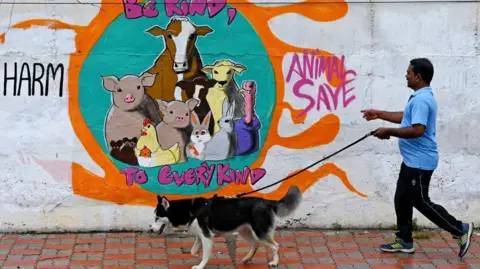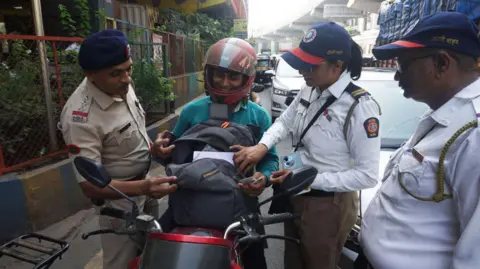 AFP
AFPIn India, you can face criminal charges for tethering an animal on the street, flying a kite in a manner that causes alarm, skipping a school attendance order or handing a feeding bottle to a mother who can’t breastfeed.
Of the 882 federal laws on the books, 370 contain criminal provisions – together criminalising 7,305 acts and omissions. These range from the absurd to the serious: failing to give a month’s notice before quitting your job or not walking your dog enough, to offences like illegal arms possession, murder and sexual assault.
Delhi-based think-tank Vidhi Centre for Legal Policy calls it “India’s crisis of over-criminalisation”.
In a new report, The State of the System: Understanding the Scale of Crime and Punishment in India, the think-tank has produced the country’s first comprehensive database of crimes, mapping the extent of criminalisation across 370 federal laws.
The report flags India’s habit of reaching for criminal law to solve just about everything – even the mundane. It notes that many laws criminalise “routine, everyday actions”.
You could, for instance, be charged for tethering your goat on a public street, fixing a leaky tap without a licence or not naming the owner of a building when asked.
Then there are the truly obscure offences – like a parent ignoring a school attendance order, applying for a driver’s licence when banned or littering in a zoo. Basically, there’s a criminal penalty waiting around every corner of daily life.
 Getty Images
Getty ImagesLet your pigs wander on to a field or road and you could be fined 10 rupees (12 cents). Disturb an animal or litter in a zoo? Six months in jail or a 2,000-rupee fine. And failing to exercise your dog can cost you up to 100 rupees and three months in jail.
Promoting infant milk substitutes or feeding bottles to pregnant women or mothers can lead to up to three years in jail or a 5,000-rupee fine. (This was meant to curb aggressive marketing by formula food companies, but the law also applies to individuals, which makes it controversial.)
Jail is the go-to punishment in India – 73% of crimes carry prison terms ranging from a single day to 20 years.
More than 250 offences across 117 laws penalise delays in filing documents – everything from wealth and property tax returns to gift declarations, the report finds.
Some 124 crimes across 80 laws criminalise obstructing a public officer, often without clearly defining what causes “obstruction”.
Even the death penalty isn’t off the table – not just for murder or mutiny, but for damaging an oil or gas pipeline or a sentry caught sleeping on duty. In all, a staggering 301 offences in India can legally cost you your life.
Out of 7,305 offences under central laws, nearly 80% come with fines – from as low as two rupees to a staggering 50m rupees.
To be fair, many of these provisions are rarely used – India’s crime records bureau tracks around 50 laws, even though 370 carry criminal penalties.
“They’re not heavily enforced, but they create ample opportunities for rent-seeking,” Naveed Mehmood Ahmad, co-author of the study at Vidhi Centre for Legal Policy, told me.
“There’s enough in the books to jail almost anyone for some technical non-compliance. It’s less about actual use and more about the potential for misuse.”
 AFP
AFPThis “excessive use of criminal law not only disrupts the daily lives of ordinary citizens but also creates significant barriers for business operations”, the report says.
Businesses in India face a maze of regulations, but using criminal law as the default for non-compliance is excessive, disproportionate and often counter-productive, experts say.
The report also talks about some glaring inconsistencies in crime and punishment.
Rioting – the use of force or violence by an unlawful assembly – is punishable with up to two years of imprisonment. Meanwhile, falsely reporting a birth or death for official records can lead to three years of imprisonment.
The irony? Violence in public gets a lighter sentence than a lie on paper.
Even more striking: crimes of vastly different severity carry the same penalty – like practicing homoeopathy without a licence, jumping a red light, or forcing someone into labour – all punishable with a one-year sentence.
The sheer number of crimes tied to everyday life and business shows how heavily the state leans on criminalisation to enforce compliance, the report says.
“This over-reliance has significant costs, not just for citizens and businesses, but also for state machinery.”
Over 34 million criminal cases are pending in India’s courts, with 72% stuck for more than a year. Prisons are overcrowded, running at 131% capacity, while courts and police forces continue to grapple with chronic staff shortages
 Getty Images
Getty ImagesEven the law-and-order machinery is stretched. As of 1 January 2023, India had just 154 police personnel per 100,000 people – well below the sanctioned 195. Nationwide, there are 581,000 vacancies against an approved strength of 2.72 million.
“Even then, we continue to rely on this overburdened system to combat minor infractions, including those that attract nominal fines,” the report says.
It says that criminal law should be limited to acts that threaten core societal values – like public safety, national security, life, liberty, property and social harmony.
Authorities say they plan to scrap criminal penalties in more than 100 legal provisions – on top of the 180 already axed in 2023. It’s not just legal clean-up; it’s a chance to rethink how the law treats people. Less fear, more trust. Less suspect, more citizen.
Source link

